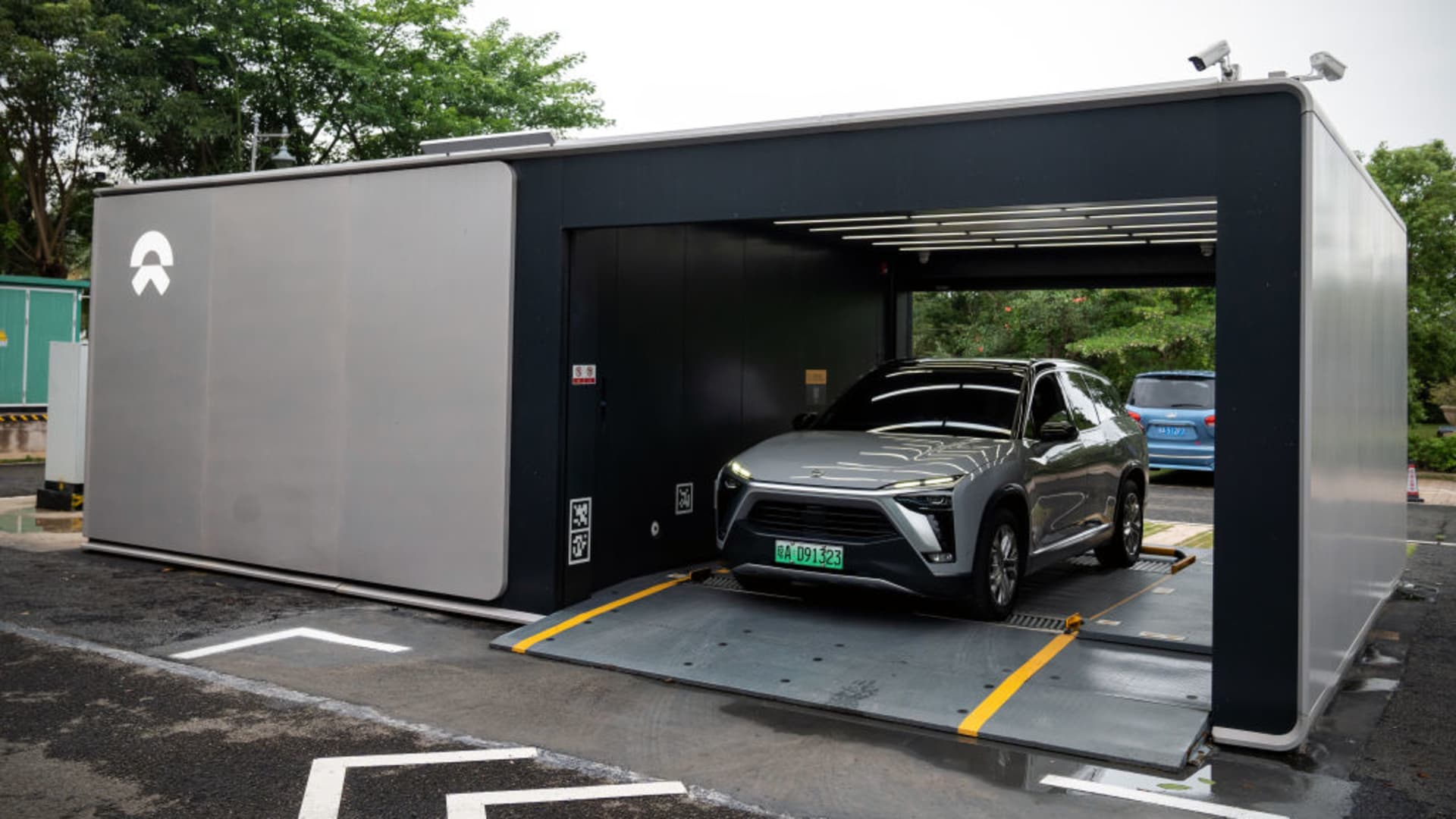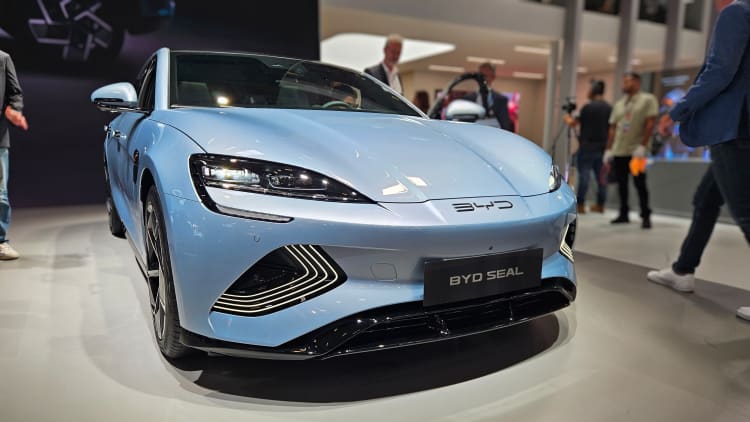
The picture shows the NIO battery replacement station in Haikou City, Hainan Province, China on May 9, 2023.
Bloomberg | Bloomberg | Getty Images
Beijing – China Electric Vehicle Company Nioh has been expanding its battery swap partnerships in a bid to gain an edge in the infrastructure of the electric vehicle ecosystem.
Since November, Nio has partnered with at least four Chinese automakers – Changan, Geely, Chery and Jianghuai – to develop battery replacement standards and expand its network in China. NIO also announced earlier this year that it would cooperate with two local battery companies to provide battery replacement services.
All these efforts are aimed at alleviating consumers’ anxiety about battery life. While having a large network of battery charging stations helps solve these problems, battery swapping is a faster method as it only takes a few minutes.
“The current exchange is mainly driven by NIO. Of course, NIO has discovered that this is an ecosystem,” Ding Luo, deputy director of the research department of CLSA, said in an interview. “It would be impossible for them if there was just one player trying to build the entire ecosystem. That’s why they are looking at whether they can invite some partners.”
He added that battery replacement is still not mainstream because car batteries need to be standardized.
While the charging station resembles a typical gas station, the battery-swapping technology is housed in a shed-like structure. It uses a machine to automatically replace a depleted battery with a pre-charged battery from a compatible car.
NIO said in mid-March that it had completed 40 million battery replacements and nearly 37 million charging times at public charging stations – NIO consumers can also use third-party charging stations or install charging stations at home.

“I think our prospects are very simple,” Shen Fei, senior vice president of NIO’s power division, said in Chinese translated by CNBC. “First, we need to serve NIO’s users, and then provide a good charging and swapping experience, making charging more convenient than refueling, while helping the company sell more cars.”
The company claims that with battery swapping, drivers can get a new charge in three minutes if they choose a paid battery service plan.
More models will be added to Nio’s battery replacement network, Shen said, while adding that the replacement allows drivers to keep up with improvements in battery technology. He did not specify which automakers might be added to its network.
Power services and other products account for only about 10% of NIO’s total revenue. The company said the “other sales” category grew 69% in 2023, reaching 6.36 billion yuan ($895.9 million). NIO did not announce exchange station revenue.
The checkered past of battery replacement
The industry has tried battery replacement, but with mixed results, especially in the U.S.
Tesla and a startup called Better Space attempted a swap more than a decade ago, but the venture quickly shut down.
In 2021, another new startup, Ample has opened battery-swapping stations in the San Francisco area, targeting Uber drivers using Nissan Leaf cars.
While it’s unclear how much progress Ample has made in the U.S., the company has expanded its partnerships overseas.Last month the company announced it would serve Corporate fleet in Kyoto, Japanalthough It works with Stellantis A battery replacement service will be launched in Madrid, Spain this year.
“This cannot be a niche market for job transfers,” said Tu Le, head of consulting firm Sino Auto Insights. “Battery inventory investment is huge, so it needs to be amortized through a large number of replacements.”
But he is cautious about whether NIO can sell enough high-priced cars to achieve economic benefits. “For now, I still think the combination of swapping and charging is a very attractive feature set, but swapping alone probably won’t help them sell more cars.”
“I think the Chinese government’s push to encourage other countries to work with NIO on swaps may create the necessary vehicle pool to make swaps feasible,” he added.
Charging business
Nio is the first major electric vehicle company to launch battery swapping stations in addition to charging stations, as well as launch its own cars in China and mainland China. Europe.
The company has installed more than 2,300 battery-swapping stations and plans to install 1,000 more this year.
NIO Chief Executive Li Bin said last month that NIO’s investment in battery-swapping stations was about two years ahead of market demand, adding that less than one-fifth of the battery-swapping stations operated by NIO handle 60 units a day. Orders, this may be the minimum order quantity required for a charging station to break even.
Nio, on the other hand, said its battery charging stations were profitable last year. Another 20,000 are planned to be built this year.
Shay Natarajan, North America partner at private equity fund Mobility Impact Partners, said a passenger car battery swap station costs about $500,000 to build, while a relatively basic charging station with two ports costs about $200,000 to $300,000. . transportation.
CLSA’s Luo said companies are also more willing to invest in regular charging stations rather than battery swapping stations because they can get higher remuneration. But he said businesses could face grid challenges if they wanted to install faster charging stations.
Analysis by CLSA found that five Superchargers at one location would require more power than 300 homes would typically consume.
Tesla also works with automakers on battery charging, and its more than 50,000 superchargers around the world claim to be able to restore about two-thirds of a battery’s power in 15 minutes.
In February, Ford reached an agreement to allow its electric vehicles to use Tesla Superchargers in North America. General Motors announced a similar deal last year.
Sustainability considerations
The rapid development of electric vehicles is ostensibly to reduce carbon emissions, but it has also raised the issue of battery waste.
NIO pointed out that the recent growth of new energy vehicles, including hybrid vehicles, means that nearly 20 million batteries will reach the eight-year warranty period between 2025 and 2032.
Last month, the company announced a partnership with the battery giant Contemporary new energy technology Develop batteries with longer life, especially for battery swap stations.
NIO claims that through battery replacement and big data, the battery can retain 80% of its capacity after 12 years of use. NIO also said last month that CATL would develop longer-life batteries for the company.
—CNBC’s Lora Kolodny and Michael Wayland contributed to this report.






